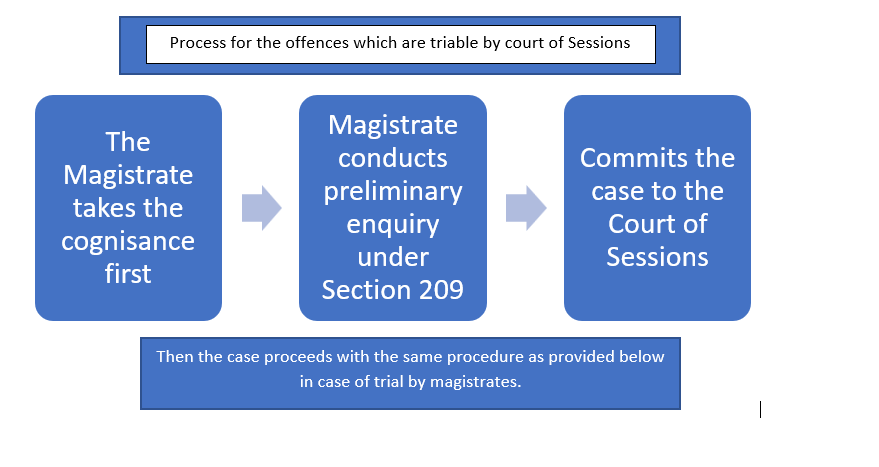
On a complaint given by the mother of victim “A” (aged 25 years), the police registers an FIR under Section 376 IPC against the accused. The victim “A” supports the allegations in her statement under Section 161 of the CrPC. But in her statement under Section 164 of the CrPC before the Magistrate, she does nost support the allegations and claims that family disputes were given a colour of criminal offence. Later on, her supplementary statement under Section 161 of the CrPC was recorded, wherein she reaffirmed her initial version and claimed that she had given statement under Section 164 of the CrPC in perplexed mental condition. In view of conflicting versions, the police files charge-sheet against the accused alleging offence under Section 376 IPC. Whether the Magistrate would take cognizance of the offence?
Issue: Whether the Magistrate has the power to take cognizance of an offence committed under Section 376 of IPC?
Rule: According to the Section 26 read with the First Schedule of the Criminal Procedure Code (hereinafter referred as “CrPC”), the offence of Rape committed under Section 376 of Indian Penal Code (hereinafter referred as “IPC”), is a cognizable and non-bailable offence and the Court of Session is the competent authority to try such cases. However, by virtue of Section 193 of CrPC, the Court of Session cannot take cognizance as a court of original jurisdiction. Where an offence is exclusively triable by a Court of Session under first schedule of CrPC, the Magistrate, taking the cognizance of such an offence, is required to commit the case for trial to the Court of Session after completing the preliminary formalities under Section 209 of the Code.
PROCEDURE WHEN COURT OF SESSION TAKE COGNISANCE OF THE OFFENCE

PROCEDURE WHEN MAGISTRATES TAKE COGNISANCE OF THE OFFENCE


DIFFERNCE BETWEEN STATEMENTS RECORDED UNDER Section 161 and Section 164 of CrPC
| Section 161 | Section 164 |
| Statements are recorded by the police officers | Statements are recorded by the Magistrate |
| The statements recorded by the police u/s.161 CrPC are not evidence for prosecution | S.164 Cr. P. C. Statement can be used for corroboration or contradiction made in the Court in the manner provided u/s. 157 and 145 of the Evidence Act. |
According to Section 209 of CrPC, the Magistrate after committing the case to the Court of Session, shall:
- Send the record of the case and the documents and articles to be produced as evidence
- Supply copy of police report and statements and documents relevant in the case
- Inform the Public Prosecutor of the commitment of the case to the Court of Session.
The purpose of asking the Magistrate to commit the case to the Court of Session is to secure the person charged with a preliminary enquiry and give him apposite time and opportunity of being acquainted with the charges levied on him.
Once the case is committed to the Court of Session by the Magistrate, the Court of Session has the jurisdiction to take cognizance of the offences.
Analysis: In the given case, based on the statements made by the victim ‘A’ and her affirmations under Section 161 of CrPC, the police filed a charge sheet against the accused alleging the offence of Rape defined under Section 376 of IPC. Since, this offence as mentioned in the Section 26 read with the First schedule of CrPC is a cognizable and non-bailable offence, hence, the Magistrate can take the cognizance of the offence but cannot try such cases, as the competent court to try such offence is the Court of Session.
Therefore, as per the procedure laid down in CrPC, the Magistrate has to compulsorily undergo the preliminary inquiry of the case first and then commit the case to the Court of Session by virtue of Section 193 of CrPC. Hence, in order to facilitate the Court of Session to try the case, the Magistrate will have to necessarily comply with the provisions of Section 193 and Section 209 of CrPC.
Furthermore, as per Section 26 of CrPC, for the offence under Section 376 of IPC, the case must be tried by a Court presided over by a woman, if possible.

Conclusion: Therefore, The Court of Session, being the competent authority to try the offence of rape as defined under Section 376 of the IPC. Hence, by virtue of Section 193 of CrPC, the Magistrate has to commit the case to the Court of Session first after conducting preliminary inquiry in such cases.





